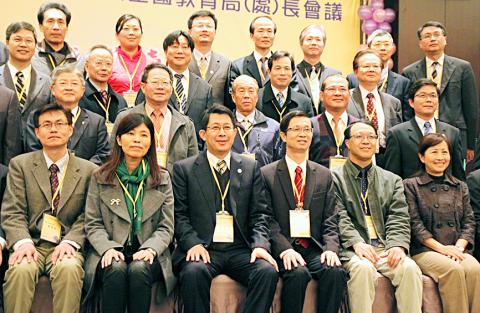Democratic Progressive Party (DPP) Legislator Chen Ting-fei (陳亭妃) yesterday urged Minister of Education Chiang Wei-ling (蔣偉寧) to fulfill his promise to make native languages a mandatory course at junior-high schools or step down if he fails to do so.
“Chiang made the promise several times at legislative meetings in October last year, and was even berated by several members of the national curriculum outlines adjustment committee at a meeting on Nov. 11 for making a hasty decision before the conclusion of public deliberations on the new curriculum, as required by law,” Chen said.
Chen added that Chiang should resign if he broke his vow to make native-language courses — which are currently optional — mandatory, with classes being held at least once a week.

Photo: CNA
According to the ministry’s timeline, nine public hearings on the draft curriculum are to be held later this month. A final version is due to be published in July, one month before the 12-year national education program takes effect in August. It will officially implemented in 2018.
The 12-year program will make three years of senior-high school part of the compulsory system of education.
A member of the committee who requested anonymity said that the committee’s main task was to decide the number of class hours allocated to each course.
“There is really no way we can squeeze in an extra hour for native-language courses if we are to follow the rule of not increasing the total number of class hours,” the member said.
“The aim of the 12-year program is to put more emphasis on personalized learning, which is why we have refrained from increasing class hours for mandatory courses. Students can then have more time to choose subjects that interest them,” the member said.
Although the draft curriculum still marks native languages as an elective, it lists the mother tongues of “new immigrants” as the nation’s fourth native language other than Taiwanese (also known as Hoklo), Hakka and Aboriginal languages, the member said.
This means that children of “new immigrants” — mainly foreign spouses from China, Vietnam, Indonesia, Thailand and the Philippines — are now given the choice of learning their parents’ native language.
Taiwanese Mother Language League director-general Chou Ching-yu (周清玉) said she believed Chiang would honor his promise, as he risks offending many language teachers and pro-localization groups who have been closely following the issue if he does not.
When asked for comment yesterday, Chiang said he would make every effort to deliver on his pledge.

CHAOS: Iranians took to the streets playing celebratory music after reports of Khamenei’s death on Saturday, while mourners also gathered in Tehran yesterday Iranian Supreme Leader Ayatollah Ali Khamenei was killed in a major attack on Iran launched by Israel and the US, throwing the future of the Islamic republic into doubt and raising the risk of regional instability. Iranian state television and the state-run IRNA news agency announced the 86-year-old’s death early yesterday. US President Donald Trump said it gave Iranians their “greatest chance” to “take back” their country. The announcements came after a joint US and Israeli aerial bombardment that targeted Iranian military and governmental sites. Trump said the “heavy and pinpoint bombing” would continue through the week or as long

TRUST: The KMT said it respected the US’ timing and considerations, and hoped it would continue to honor its commitments to helping Taiwan bolster its defenses and deterrence US President Donald Trump is delaying a multibillion-dollar arms sale to Taiwan to ensure his visit to Beijing is successful, a New York Times report said. The weapons sales package has stalled in the US Department of State, the report said, citing US officials it did not identify. The White House has told agencies not to push forward ahead of Trump’s meeting with Chinese President Xi Jinping (習近平), it said. The two last month held a phone call to discuss trade and geopolitical flashpoints ahead of the summit. Xi raised the Taiwan issue and urged the US to handle arms sales to

State-run CPC Corp, Taiwan (CPC, 台灣中油) yesterday said that it had confirmed on Saturday night with its liquefied natural gas (LNG) and crude oil suppliers that shipments are proceeding as scheduled and that domestic supplies remain unaffected. The CPC yesterday announced the gasoline and diesel prices will rise by NT$0.2 and NT$0.4 per liter, respectively, starting Monday, citing Middle East tensions and blizzards in the eastern United States. CPC also iterated it has been reducing the proportion of crude oil imports from the Middle East and diversifying its supply sources in the past few years in response to geopolitical risks, expanding

OTHER OPTIONS: Given possible US intervention and Taiwanese counterattacks, China might opt to blockade Taiwan or take its outlying islands instead of an all-out invasion A US think tank has urged Taiwan to adopt a “hellscape” strategy that would flood the Taiwan Strait with drones and other uncrewed systems to deter invasion by China. In its report, Hellscape for Taiwan, published on Thursday, the Center for a New American Security said Taipei’s asymmetric defense approach — often described as a “porcupine strategy” — needs to evolve to keep pace with the growing capabilities of the Chinese People’s Liberation Army. The “hellscape” strategy involves saturating the air and waters around Taiwan with thousands of drones and other platforms capable of striking invading forces from multiple domains at once. Long-range